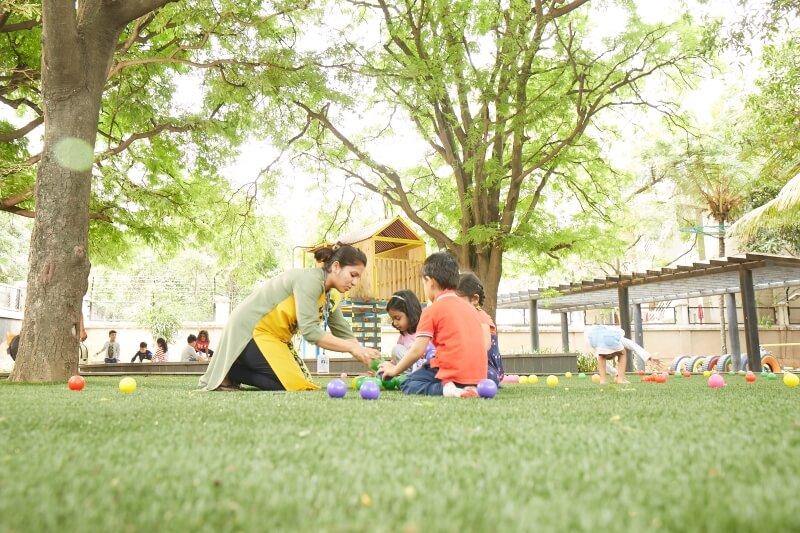Table of Contents
ToggleThe Significance of Effective Communication Skills for Students
Effective relationships are built through effective communication. Our ability to interact intelligently with peers and higher authorities depends on our communication skills. As a student, having the ability to express oneself confidently and handle conflicts is an essential marker for success. A hardworking and bright student may not be able to reach their full potential due to a lack of efficient communication skills. Practising and honing communication skills can improve children’s leadership abilities and open many doors for them. A child with good communication skills also develops the confidence to explore their own abilities and a sense of individuality.
(We recommend adding an image here with the primary keyword as an image alt tag)
Building communication skills in kids is a gradual process, so let us look at some skills and how they align with Inventure’s values.
Look at our student’s life at our Inventure Campus
The Importance of Active Listening
Good communication includes active listening, which means listening with ALL your senses. We all believe we are good listeners, but if we really think about it, we may only be ‘half listening’. There lies a clear difference between LISTENING and HEARING, and what makes a difference is being in the moment – present for the speaker. When you listen with the intention of understanding, it validates the speaker’s feelings and perspective, and as the listener, you demonstrate respect through your attentive approach. This cultivates empathy and compassion between both of you, essential in good communication. So how does one do this? Giving undivided attention, and observing nonverbal cues and body language is essential for a healthy conversation. Listening skills also enhance awareness of the present moment and provide more opportunities to talk on various subject matters during a conversation.
Understanding Nonverbal Communication
A study conducted at the University of California, Los Angeles (UCLA) found a majority of communication to be nonverbal – 55% through our posture, tone and gestures; and only about 7% through words. Our nonverbal cues are important communication tools, as they show others how interested we are in the conversation; how receptive we are to the feedback we are receiving; reinforce the meaning of what we are saying, and convey genuineness and authenticity. These cues contribute to our individuality and build our ability to work in teams.
To begin with, become more aware of your own body language – where are you looking when someone is speaking to you? What tone do you use when you are happy/ or annoyed/ or excited? How does your voice change? What gestures are you making? Are you tapping your feet or are you standing as you speak?
Understanding our own body language and observing the body language of others are effective communication skills, because they are a window into the other’s world and create more impactful conversations.
The Art of Negotiation
There is beauty in diversity. To appreciate all the uniqueness in this diverse world, one must build greater tolerance and acceptance. In every sphere of life, we will be challenged with circumstances and people who lead different belief systems. Negotiation is a skill that can allow peaceful agreements and diffuse the tension with respect; thereby improving relationships through effective communication. Oftentimes, one has to put one’s foot down and negotiate and compromise. This does not hinder one’s learning opportunities; instead, it builds them and further cultivates dynamic growth. The ultimate goal that needs to be kept in mind while negotiating is to aim for a win-win outcome and not a you v/s them scenario. Your attitude is crucial and can be conveyed through the way you speak and the body language you use.
Giving Constructive Feedback
Feedback is an important part of growth and development, and also of good communication. Daniel Kahneman, psychologist and author of “Thinking Fast and Slow” states that “true intuitive expertise is learned from prolonged experience with good feedback on mistakes.” Giving feedback is a skill that has to be cultivated – when given in the right way, it communicates integrity and sensitivity. It is crucial that while giving feedback the other person feels safe, and respected. While conveying feedback, concentrate on the behaviour and not the person, balance your content with strengths and opportunities for growth. And lastly, continue to offer support without judging the other person.
Conclusion: The Power of Effective Communication
To conclude, our communication styles show how passionate we are in the pursuit of excellence. It shows the world that when given the freedom to say anything and act in any way we want, we can choose to be responsible. As students, inculcating these communication skills into our lives pave the way to a successful journey ahead.
To sum up, communication allows you to move forward, but effective communication can work wonders.
About the authors
Smriti Khurana
Smriti Khurana is a psychologist and school counsellor at Inventure Academy. Her work is guided by the principles of a humanistic and person-centred approach which emphasises that with adequate support, trust and guidance, all individuals are capable of discovering their own solutions to their problems. Smriti believes in the power of community support in personal growth and development.
Niveadha
Niveadha is a child psychologist and school counsellor at Inventure Academy. Her therapeutic work is rooted in the belief that understanding about one’s situation can facilitate the process of change, therefore, she uses various insight-oriented techniques in her work. She is passionate about learning and seeks out new ideas and concepts that can help in her young clients’ emotional and psychological growth.
Frequently Asked Questions about Effective Communication Skills for Students
How does effective communication support student success?
Effective communication supports student success by helping them interact intelligently with peers and higher authorities, express themselves confidently, handle conflicts, and reach their full potential. Good communication skills can also improve children’s leadership abilities, open many doors for them, and help them develop confidence to explore their own abilities and a sense of individuality.
How can teachers build effective communication with the students?
Teachers can build effective communication with students by practising active listening, becoming more aware of their body language, learning to negotiate and compromise, and giving feedback in a respectful and constructive manner. It is also important for teachers to create a safe and supportive learning environment where students feel comfortable expressing themselves and seeking help when needed.
How can active listening improve communication?
Active listening involves listening with all your senses and being present in the moment for the speaker. When you listen with the intention of understanding, it validates the speaker’s feelings and perspective, and as the listener, you demonstrate respect through your attentive approach. This cultivates empathy and compassion between both of you. Active listening also enhances awareness of the present moment and provides more opportunities to talk on various subject matters during a conversation.
How does nonverbal communication affect our interactions with others?
Nonverbal communication includes our posture, tone, gestures, and other cues that convey information without using words. Our nonverbal cues show others how interested we are in the conversation; how receptive we are to the feedback we are receiving; reinforce the meaning of what we are saying, and convey genuineness and authenticity. These cues contribute to our individuality and build our ability to work in teams.



